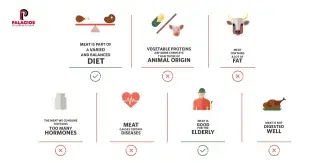The truth about meat

In the latest issue of the magazine of the National Meat Processing Industries Association of Spain (ANICE), Nelson Huerta-Leidenz, international advisor and associate researcher at Texas Tech University, has scientifically refuted the myths and false information about meat. These are his conclusions.
Meat is part of a varied and balanced diet: TRUE
According to Huerta-Leidenz, meat is an important source of macro and micronutrients in the context of a varied and balanced diet. Among other benefits, the researcher highlights its supply of vitamin B12, only available in foods of animal origin, which is essential for the formation of red blood cells. In addition, Huerta-Leidenz reminds us that meat proteins contain the 20 amino acids that our body requires to function correctly. Not forgetting that it also provides iron, which provides the vital function of carrying oxygen.
Vegetable proteins are more complete than those of animal origin: FALSE
In fact it is the other way around. Animal proteins are more complete than vegetable proteins, in the words of the researcher. Since animal protein contains all the essential amino acids it is considered of high biological value; whilst vegetable protein does not contain them all.
Meat contains a lot of fat: FALSE
Huerta-Leidenz is clear that generalizing that meat is high in fat is incorrect. Each type and cut of meat has a different proportion.
And we must keep in mind that fat is an essential nutrient for health. This is why a few years ago the dietary guidelines changed from recommending “low fat diets” to “moderate fat diets." There is consensus among medical societies that low-fat diets are probably not a good idea, as they induce dyslipidemia (a disorder that increases the risk of cardiovascular disease).
Meat causes certain diseases: FALSE
Obviously, you cannot specifically blame any food of animal origin for causing certain diseases. Food alone does not cause or cure diseases. In contrast to what people believe. The World Health Organization (WHO) does not advise the population to eliminate the consumption of processed meat but to moderate it.
The key is to maintain a varied and balanced diet.
The meat we consume contains too many hormones: FALSE
Huerta Leidenz states that this is a widespread myth and a hoax. Proof of this is that Directive 96/22/EC prohibits the use of hormones in animals for consumption, except for therapeutic and zootechnical purposes and under strict veterinary control. In addition, to ensure compliance, the European Food Safety Authority (EFSA) performs periodic analyzes of meat samples from different companies, not only for hormones, but also for antibiotics and other prohibited substances.
Meat is good for the elderly: TRUE
The prestigious researcher states that numerous studies have concluded that eating foods high in protein of high biological value stimulates the process of muscle formation, as well as bone strength, and reduces hip fractures. In addition, eating meat at an advanced age helps improve cognitive abilities.
Meat is not digested well: FALSE
According to Huerta-Leidenz, it has been found that amino acids from pork and beef loin have a higher digestibility than those from salmon. The fact is red meat has a high satiety index, an important characteristic in foods included in weight loss diets.
Read the full article here: https://www.anice.es/industrias/de-actualidad/revista-de-anice_10_34_16781_0_1_in.html


